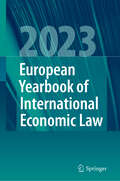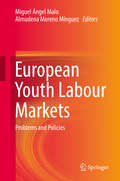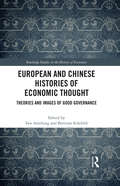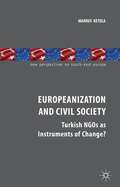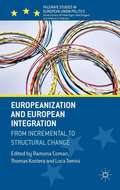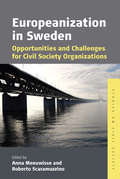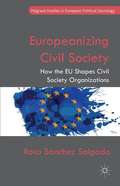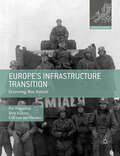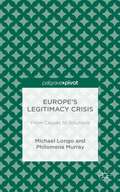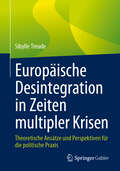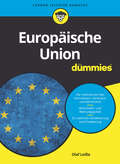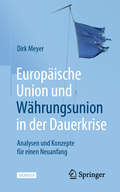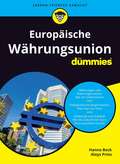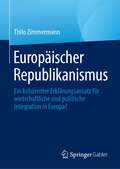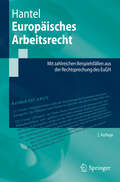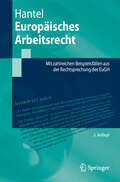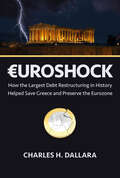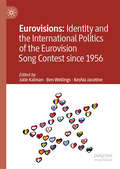- Table View
- List View
European Yearbook of International Economic Law 2023 (European Yearbook of International Economic Law #14)
by Markus Krajewski Jörg Philipp Terhechte Marc Bungenberg Andreas R. Ziegler Christina Binder Jelena Bäumler Christian J. Tams Giesela RühlThe focus of volume 14 of the EYIEL is on “(Public) Procurement and Competition Law in European and International Economic Law”. It is testimony to the fact that areas of law originally perceived as purely economic are permeated by the challenges of society today and adapting to these by embracing innovation, promoting sustainability and social responsibility and including new values in their legal constitutions. Thus, the focus section provides a broad spectrum of contributions considering the interaction between (public) procurement law and WTO law, the role of RTAs, the inclusion of sustainability aspects as well as the influence recent development and challenges such as the Covid-19 pandemic and climate change have on public procurement and competition policy. In its general section the EYIEL considers “Current Challenges, Developments and Events in European and International Economic Law”. It provides a cross-section of recent developments touching upon the Next Generation EU, food commodification, new regulatory approaches to geographical indications, the interaction between investment law and human rights as well as the newest developments with regard to Public-Private Partnership Legislation.
European Youth Labour Markets: Problems and Policies
by Miguel Ángel Malo Almudena Moreno MínguezThis timely analysis examines the complex state of youth unemployment across Europe and offers cogent policy suggestions for addressing this longstanding societal problem. The findings reveal numerous national and regional factors affecting youth joblessness—not only market and economic challenges, but also deep sociocultural and political dynamics underlying the situations. Coverage details how the standard transition from school to work is disrupted in an already depressed adult job market, and compares a wide range of responses in terms of both young people’s educational decision-making and national youth policy. In particular, contributors assess whether the current crop of Youth Guarantee programs can/should be a model for employment policy across the continent.Among the topics covered:Youth labour market prospects and recent policy developments.Youth labour market in Central and Eastern Europe.Early school dropout in Spain: evolution during the Great Recession.Overeducation among European university graduates: a constraint or a choice?Promoting youth employment in Europe: evidence-based policy lessons.The evaluation of a Finnish youth guarantee: lessons for Europe?European Youth Labour Markets is of interest to an international audience of economists, sociologists, and leaders in governmental, non-profit, and corporate sectors through its broad and comparative macroeconomic focus and implications for policymaking, research, resource allocation, and policy evaluation.
European and Chinese Histories of Economic Thought: Theories and Images of Good Governance (Routledge Studies in the History of Economics)
by Iwo AmelungThe Western literature on the history of Chinese economic thought is sparse, and comparisons with the history of Western economic thought even more so. This pioneering book brings together Western and Chinese scholars to reflect on the historical evolution of economic thought in Europe and China. The international panel of contributors cover key topics such as currency, usury, land tenure, the granary system, welfare, and government, and special attention is given to monetary institutions and policies. The problem of "good government" emerges as the unifying thread of a complex analysis that includes both theoretical issues and applied economics. Chinese lines of evolution include the problem of the agency of the State, its ideological justification, the financing of public expenditure, the role played by the public administration, and the provision of credit. The early radical condemnation of usury in the Near East and in the West gives way to theoretical justifications of interest-taking in early capitalist Europe; they, in turn, lead to advances in mathematics and business administration and represent one of the origins of modern economic theory. Other uniting themes include the relationship between metallic and paper money in Chinese and European experiences and the cross-fertilization of economic practices and ideas in the course of their pluri-millennial interactions. Differences emerge; the approach to the organization of economic life was, and still is, more State-centred in China. The editors bring together these analytical threads in a final chapter, opening wider horizons for this new line of comparative economic research which is important for the understanding of modern ideological turns. This volume provides valuable reading for scholars in the history of economic thought, economic history and Chinese studies.
Europeanisation of Private Enforcement of Competition Law: The Case of Albania
by Gentjan SkaraThis book argues that the European integration process (Europeanisation) is pushing the member states and candidate countries toward a greater convergence with the EU’s competition acquis. Through the transposition of the Directive 2014/104/EU, the member states have harmonised substantive and procedural rules, which is beneficial to individuals and enterprises because it provides a minimum protection across all member states. In addition, it is commonly agreed in academia that the prospect of EU membership brings positive domestic changes in the candidate countries. At the moment, Albania is waiting to open negotiations for the chapters of the EU acquis.Firstly, this book addresses the evolution of private enforcement at the European level by examining the objectives, modalities, and actors that contributed to the development of private enforcement. Secondly, it analyses the Directive 2014/104/EU and how the three selected EU member states have transposed the directive into their domestic legal system considering the discretion margin left by Article 288 TFEU and a minimum harmonisation level defined in the directive. Thirdly, it provides a historical overview of private enforcement in Albania and shows how the Albanian Competition Authority has addressed the transposition of the Directive 2014/104/EU.
Europeanization and Civil Society
by Markus KetolaDo NGOs strengthen Turkey's efforts at Europeanization and democratization or do they use EU funding to serve other interests?This book offers a critical investigation of the relationship between Turkish NGOs and the European Union (EU) and a nuanced assessment of the opportunities and limitations to fashioning social change by funding NGOs.
Europeanization and European Integration
by Ramona Coman Thomas Kostera Luca TominiAfter two decades of research into the impact of the EU on domestic politics and policies, this book explores the relationship between Europeanization and EU integration. It argues that Europeanization should be considered as a stage in the development of EU integration as well as questioning the notion of incremental Europeanization.
Europeanization in Sweden: Opportunities and Challenges for Civil Society Organizations (Studies on Civil Society #10)
by Anna Meeuwisse Roberto ScaramuzzinoNotwithstanding its many successes since 1945, the project of European integration currently faces major difficulties, from financial crises and mass immigration to the impending departure of the UK from the European Union. At the same time, these challenges have spurred civil society organizations within and across Europe, revealing a shared public sphere in which citizens can mobilize around refugee rights, opposition to austerity policies, and other issues. Europeanization in Sweden assembles new empirical research on how these processes have played out in one of the continent’s wealthiest nations, providing insights into whether, and how, the “Swedish model” can guide European integration.
Europeanizing Civil Society
by Rosa Sanchez SalgadoThe European Union clearly matters for Civil Society Organizations (CSOs). EU officials and European political entrepreneurs has been crucial in the promotion of funding and access opportunities, but they have been proven to have little capacity to use CSOs for their own purposes.
Europeanizing Greece
by Nancy VamvakasWhile Greece's debt crisis continues to dominate international headlines, the country has received remarkably little scholarly attention - especially in comparison to other European Union members. Europeanizing Greece explores the developments that resulted from Greece's European integration between 1989 and 1999, which played a crucial role in shaping the country's current conditions.Focusing on changes made to the Greek administrative and political system based on EU structural policy, Nancy Vamvakas contends that EU involvement was not the only reason why these modifications were implemented. Vamvakas points out serious flaws in the Greek system and demonstrates how Greece's approach to reform has been inextricably linked to the perceived level of crises. Europeanizing Greece serves as a perceptive case study of the EU's continual enlargement and resulting regional challenges.
Europe’s Infrastructure Transition: Economy, War, Nature (Making Europe)
by Per Högselius Arne Kaijser Erik Van Der VleutenEurope’s Infrastructure Transition.
Europe’s Infrastructure Transition: Economy, War, Nature (Making Europe)
by Per Högselius Arne Kaijser Erik van der VleutenEurope's infrastructure both united and divided peoples and places via economic systems, crises, and wars. Some used transport, communication, and energy infrastructure to supply food, power, industrial products, credit, and unprecedented wealth; others mobilized infrastructure capacities for waging war on scales hitherto unknown. Europe's natural world was fundamentally transformed; its landscapes, waterscapes, and airscapes turned into infrastructure themselves. Europe's Infrastructure Transition reframes the conflicted story of modern European history by taking material networks as its point of departure. It traces the priorities set and the choices made in constructing transnational infrastructure connections - within and beyond the continent. Moreover, this study introduces an alternative set of historically-key individuals, organizations, and companies in the making of modern Europe and analyzes roads both taken and ignored.
Europe’s Legitimacy Crisis: From Causes to Solutions
by Michael Longo Philomena MurraySharp in focus and succinct in analysis, this Pivot examines the latest developments and scholarly debates surrounding the sources of the European Union's crisis of legitimacy and possible solutions. It examines not only the financial and economic dimensions of the current crisis, but also those crises at the heart of the EU integration project.
Europäische Desintegration in Zeiten multipler Krisen: Theoretische Ansätze und Perspektiven für die politische Praxis
by Sibylle TreudeDie Nachkriegsgeschichte ist geprägt vom Gedanken des stetigen Zusammenwachsens Europas. Schon die ökonomischen Krisen der vergangenen Jahre ließen jedoch verstärkt Zweifel an dieser Linearität aufkommen, die spätestens durch den Brexit enorm verstärkt werden. Dieses wissenschaftliche Textbuch gibt einen Einblick in den interdisziplinären Diskurs und das mittlerweile vielseitige Angebot an (des-)integrationstheoretischen Ansätzen zur Beschreibung, Erklärung und Prognose von Krisen und von der Desintegration Europas. Im Zentrum der Betrachtung stehen sowohl drei als etabliert geltende Forschungsrichtungen als auch drei jüngere Ansätze, die bis dahin noch nicht fokussierte Fragen, Aspekte und Ursache-Wirkungszusammenhänge aufzeigen und neue Modellierungen europäischer (Des-)Integrationsphänomene und -entwicklungen ermöglichen.Das Buch richtet sich an in dem Themengebiet fortgeschrittene Studierende, Wissenschaftler, Politiker im EU-Kontext, in der Politikberatung Tätige sowie alle, die an der politischen und wirtschaftlichen EU-Integration interessiert sind.
Europäische Union für Dummies (Für Dummies)
by Olaf LeißeDie Europäische Union beeinflusst das Leben aller Menschen - ob es Studierende der Politischen Wissenschaften sind, die dieses Pflichtmodul bestehen müssen, oder der Normalbürger, der sich fragt, wie sich die Geldpolitik der Europäischen Zentralbank wohl auf seine Ersparnisse auswirkt. Studierenden oder Sparern gemein ist das Staunen über die Vielfalt der europäischen Organisationen und deren Möglichkeit zur Gestaltung von Politik. Olaf Leiße schafft Klarheit. Leicht verständlich erläutert er die Aufgaben und Funktionen der großen Organisationen wie Europäischem Rat, Europäischer Kommission, Europäischem Parlament und Europäischem Gerichtshof und zeigt, wie sie die Wirtschafts- und Währungspolitik, die Wettbewerbs- und Förderpolitik, die Außen- und Sicherheitspolitik, die Landwirtschafts- und Umweltpolitik und die Bildungspolitik für die 500 Millionen Menschen der 28 Länder gestalten, die Mitglieder der Europäischen Union sind. Nach der Lektüre dieses Buches werden Ihnen viele Entscheidungen in dieser großen Gemeinschaft klarer.
Europäische Union und Währungsunion in der Dauerkrise I: Eine Bestandsaufnahme
by Dirk MeyerDie europäischen Integrationsanstrengungen stehen auf der Kippe. Dabei wirkt die Euro-Währungsunion in ihrer jetzigen Verfassung ungewollt eher als ein Des-Integrationsfaktor denn als ein verbindendes Element. Dirk Meyer liefert Zustandsbeschreibungen, Analysen und Hintergründe dieser Krise. Das Buch ist das Ergebnis einer über zehnjährigen Beschäftigung mit der Thematik.
Europäische Union und Währungsunion in der Dauerkrise II: Szenarien für die Zukunft des Euro
by Dirk MeyerDie europäischen Integrationsanstrengungen stehen auf der Kippe. Dabei wirkt die Euro-Währungsunion in ihrer jetzigen Verfassung ungewollt eher als ein Des-Integrationsfaktor denn als ein verbindendes Element. Dirk Meyer liefert Zustandsbeschreibungen, Analysen, Hintergründe und Zusammenhänge, die in der Tagespolitik entweder gar nicht zum Tragen kamen oder aber schnell vergessen wurden. Konzepte einer möglichen Umstrukturierung der Währung hin zu einer funktionsfähigen Gemeinschaftswährung bilden einen konstruktiv-zuversichtlich stimmenden Ausblick. Das Buch ist das Ergebnis einer etwa zehnjährigen Beschäftigung mit der Thematik.
Europäische Union und Währungsunion in der Dauerkrise: Analysen und Konzepte für einen Neuanfang
by Dirk MeyerDie europäischen Integrationsanstrengungen stehen auf der Kippe. Dabei wirkt die Euro-Währungsunion in ihrer jetzigen Verfassung ungewollt eher als ein Des-Integrationsfaktor denn als ein verbindendes Element. Dirk Meyer liefert Zustandsbeschreibungen, Analysen, Hintergründe und Zusammenhänge, die in der Tagespolitik entweder gar nicht zum Tragen kamen oder aber schnell vergessen wurden. Konzepte einer möglichen Umstrukturierung der Währung hin zu einer funktionsfähigen Gemeinschaftswährung bilden einen konstruktiv-zuversichtlich stimmenden Ausblick. Das Buch ist das Ergebnis einer etwa zehnjährigen Beschäftigung mit der Thematik.
Europäische Währungsunion für Dummies (Für Dummies)
by Hanno Beck Aloys PrinzEuro-Krise, EZB, Währungsunion, Rettungsschirm. Begriffe wie diese begegnen Ihnen täglich in den Medien. Doch was bedeuten sie konkret? Wie funktioniert eine Währungsunion und welche Probleme bringt sie mit sich? Wie kam es zur Euro-Krise? Wie hat die Politik reagiert? Welche Wege gibt es dort hinaus und wie sollen sie funktionieren? Hanno Beck und Aloys Prinz erklären den Euro und die Euro-Krise fundiert und wunderbar verständlich. So können Sie sich in Zukunft selbst ein Bild von der Lage und der Zukunft der Euro-Zone machen und Rettungspakete, Schuldenbremse, Vergemeinschaftung von Schulden und andere Politiken besser bewerten.
Europäischer Republikanismus: Ein kohärenter Erklärungsansatz für wirtschaftliche und politische Integration in Europa?
by Thilo ZimmermannIn diesem Buch werden die aktuellen Theorien der europäischen Integration, wie Föderalismus, Neofunktionalismus und liberaler Intergouvernementalismus, mit ihren Stärken und Schwächen vorgestellt. Es wird dann argumentiert, dass die Kombination der republikanischen Theorie mit der Theorie des öffentlichen Gutes, der res publica der öffentlichen Güter, die europäische Integration besser erklären könnte. Die Theorie der öffentlichen Güter muss jedoch übernommen werden, um sie auf den europäischen Republikanismus anwendbar zu machen. Schließlich zeigt das Buch, wie dieser neue Rahmen weitere akademische Debatten beeinflussen kann, z. B. über Souveränität und Währungsintegration, externe Effekte eines gemeinsamen europäischen Marktes und die treibende Kraft der europäischen Integration. Da der republikanische Ansatz nicht einer rein wirtschaftlichen Logik folgt, bleibt Raum für politische Überlegungen und Motivationen. In diesem aktuellen und interdisziplinären Buch verbindet der Autor viele wichtige Stränge der europäischen Integrationstheorie, der Geschichte, der Ökonomie und der Politikwissenschaften, die klar zu einem kohärenten analytischen Diskurs zusammengeführt werden. Seine Stärke liegt in der interdisziplinären Interaktion zwischen Politik und Wirtschaft sowie in theoretischen und praktischen Fragen, die für die öffentliche Debatte in Europa von hoher Relevanz sind. Dieses Buch wird für Wissenschaftler und Studenten von Interesse sein, die sich für wirtschaftliche Integration sowie für Geschichte und politische Philosophie interessieren.
Europäisches Arbeitsrecht: Mit zahlreichen Beispielsfällen aus der Rechtsprechung des EuGH (Springer-Lehrbuch)
by Peter HantelDas Lehrbuch behandelt die für das deutsche Arbeitsrecht bedeutsamen EU-rechtlichen Problembereiche wie den allgemeinen EU-Arbeitnehmerschutz, Diskriminierungsverbote in Gehalts- und sonstigen Angelegenheiten, Insolvenzsicherung, Betriebsübergang, Massenentlassung, Arbeitszeit und Urlaubsfragen sowie prekäre Arbeitsverhältnisse. Ergänzend werden kollektivrechtliche und kollisionsrechtliche Fragestellungen dargestellt. Alle Problembereiche werden im Zusammenhang mit den für das deutsche Arbeitsrecht besonders relevanten EuGH-Entscheidungen erläutert. Dabei werden Sachverhalt und EuGH-Leitsätze komprimiert und gut lesbar wiedergegeben. Studenten der Rechts- und Wirtschaftswissenschaften aber auch Rechtsanwälten und Praktikern im HR Bereich wird damit ein Überblick über Grundfragen und Probleme des Europäischen Arbeitsrechts im Zusammenhang mit der Darstellung von insgesamt 98 für die betriebliche Praxis besonders wichtigen EuGH-Entscheidungen vermittelt.Neben neuen EuGH-Entscheidungen (etwa zur Massenentlassungs-Richtlinie RL 98/59/EG, Insolvenzschutz-Richtlinie RL 2008/94/EG sowie zu den Antidiskriminierungs-Richtlinien RL 2000/43/EG, RL 2000/78/EG und RL 2006/54/EG) berücksichtigt die vorliegende zweite Auflage u.a. die Änderung der Entsende-Richtlinie sowie die Auswirkungen der Datenschutzgrundverordnung (DSGVO) auf Arbeitnehmer.
Europäisches Arbeitsrecht: Mit zahlreichen Beispielsfällen aus der Rechtsprechung des EuGH (Springer-Lehrbuch)
by Peter HantelDas Lehrbuch behandelt die für das deutsche Arbeitsrecht bedeutsamen Entscheidungen des EuGH. Der Schwerpunkt liegt auf den Themen Arbeitnehmerfreizügigkeit, Diskriminierungsverbote in Geschlechts- Gehalts- und sonstigen Angelegenheiten, Insolvenzsicherung, Betriebsübergang, Massenentlassung, Arbeitszeit und Urlaubsfragen sowie prekäre Arbeitsverhältnisse und dem Beschäftigten-Datenschutz. Ergänzend werden kollektivrechtliche und kollisionsrechtliche Fragestellungen behandelt. Alle Problembereiche werden im Zusammenhang mit einschlägigen EuGH-Entscheidungen erläutert. Dabei werden Sachverhalt und EuGH-Leitsätze komprimiert und gut lesbar wiedergegeben. Studierende der Rechts- und Wirtschaftswissenschaften aber auch Rechtsanwält*innen und Praktiker*innen im HR Bereich wird damit ein Überblick über Grundfragen und Probleme des Europäischen Arbeitsrechts im Zusammenhang mit der Darstellung von insgesamt 90 für die betriebliche Praxis besonders wichtigen EuGH-Entscheidungen vermittelt. Neben neuen EuGH-Entscheidungen zur Teilzeitarbeits- (RL 97/81/EG) und zur Befristungs-(1999/70/EG) sowie zur Entsende-Richtlinie (96/71/EG) berücksichtigt die vorliegende 3. Auflage auch die neuere Rechtsprechung zur Arbeitszeit und deren Kontrolle durch Unternehmen sowie erste Entscheidungen zum Beschäftigten-Datenschutz und damit zusammenhängenden Schadensersatzansprüchen.
Europäisches Immaterialgüterrecht: Funktionen und Perspektiven (MPI Studies on Intellectual Property and Competition Law #26)
by Reto M. Hilty Thomas JaegerDas Buch folgt der Ausgangsvermutung, dass die EU nach wie vor keine kohärente Immaterialgüterrechtspolitik verfolgt, sondern über punktuelle, meist anlassbezogene Maßnahmen agiert. Die Schutzrechte erfüllen die ihnen zugedachten Funktionen damit oft nicht. Vor allem entfalten sie nicht ihr volles Potenzial für den Binnenmarkt.Untersucht wird, inwieweit die Regelungen der einzelnen Schutzrechte in sich selbst, im Verhältnis zu einander sowie zum sie umgebenden Wettbewerbsrecht, aber auch zum nationalen Recht funktionsadäquat sind.Dieser breit angelegte Gesamtblick auf den Acquis Communautaire erlaubt es aufzuzeigen, wo Handlungsbedarf besteht, wie alternative Regelungen aussehen könnten und welche Mechanismen dafür zur Verfügung stehen.
Europäisches Steuerverfassungsrecht: Symposion aus Anlass der Verabschiedung von Professor Dr. h.c. Rudolf Mellinghoff als Präsident des Bundesfinanzhofs (MPI Studies in Tax Law and Public Finance #11)
by Wolfgang Schön Johanna HeyDieser Band enthält Beiträge führender Steuer-, Verfassungs- und Europarechtswissenschaftler zu aktuellen Fragen des Europäischen Steuerverfassungsrechts. Die Aufsätze beruhen auf Vorträgen, die am 20. Mai 2022 anlässlich eines Festsymposions zur Verabschiedung von Professor Dr. h.c. Rudolf Mellinghoff als Präsident des Bundesfinanzhofs vorgestellt wurden. Das Themenspektrum reicht dabei von den Kompetenzen des Europäischen Steuergesetzgebers und dem Grundrechtsschutz im Bereich des europäischen Steuerrechts bis hin zu Vorschlägen für eine stärkere demokratische Rückanbindung im Fall der Einführung europäischer Steuern sowie zu Ausführungen zum Verhältnis von Persönlichkeitsrechten und öffentlichem Informationsinteresse bei der Offenlegung von Steuerdaten. Die Beiträge nehmen neben dem geltenden Recht stets auch die Zukunft und die Entwicklungsmöglichkeiten des Europäischen Steuerverfassungsrechts in den Blick.
Euroshock: How the Largest Debt Restructuring in History Helped Save Greece and Preserve the Eurozone
by Charles H. DallaraThe inside story of the unprecedented restructuring of Greece’s debt in 2012—the largest restructuring in history—and how the Eurozone was stabilized and Greece was saved from exit from the Euro and economic calamity. In the fall of 2009, the world economy was beginning to recover from the global financial crisis that had shaken global markets and had led to a sharp recession. At the same time, Europe was entering a new phase of economic stress. By the spring of 2011, the European economy had exploded into a full-blown crisis with Greece at the center. The euro, a currency just over a decade old, was under severe pressure and there was growing speculation about Greece leaving the Eurozone and thereby fracturing the common currency, leading potentially to an unraveling of the euro. Against this backdrop, urgent negotiations were launched to pull Greece and Europe back from the brink of disaster. This is the inside story of those negotiations.
Eurovisions: Identity and the International Politics of the Eurovision Song Contest since 1956
by Julie Kalman Ben Wellings Keshia JacotineThis book uses the Eurovision Song Contest (ESC), as an analytical entry point to understand and illuminate post-War Europe and the drive to create an identity that can legitimise the European project in its broadest sense. The ESC presents an idealised vision of Europe, and this has long existed in a strained relationship with reality. While the trajectory of post-war European integration is a high-profile topic, we believe that the ESC offers a unique and innovative way to think about the role of culture in the history of post-War European integration and tensions between the ideal and reality of European unity. Through the series of case studies that make up the chapters in this book, analysis brings these interlinked tensions to light, exploring the roles of culture and identity, alongside and a productive conversation with the political and economic projects of post-war European integration.
